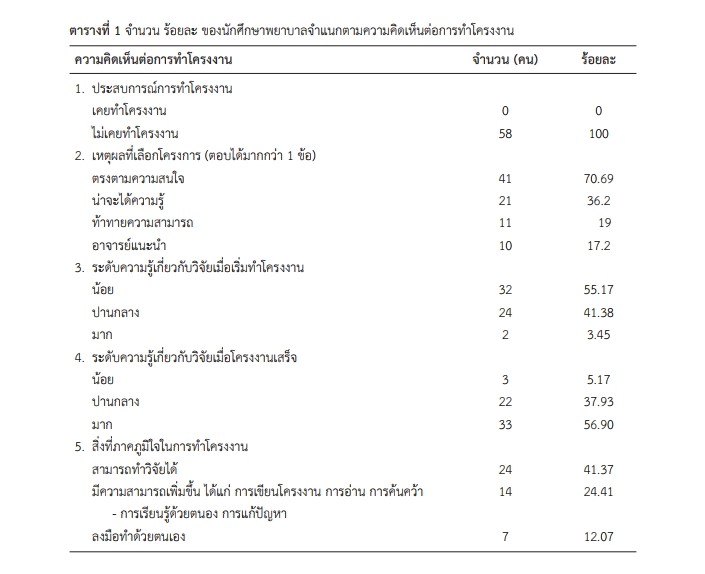มุมมองของนักศึกษาพยาบาลเกี่ยวกับการพัฒนาสมรรถนะวิจัยและ ทักษะแห่งศตวรรษที่ 21 ด้วยการจัดการเรียนรู้แบบโครงงานเป็นฐาน
คำสำคัญ:
พัฒนา, สมรรถนะการวิจัย, ทักษะศตวรรษที่ 21, โครงงานเป็นฐานบทคัดย่อ
ผลการวิจัยพบว่า นักศึกษามีความรู้เรื่องการวิจัยน้อยเมื่อเริ่มทำโครงงาน และมีความรู้เรื่องการวิจัยระดับมากภายหลังทำโครงงาน (ร้อยละ 55.17 และ 56.90 ตามลำดับ) มุมของนักศึกษาพยาบาลเกี่ยวกับการพัฒนา มีประเด็นหลัก 2 ประเด็น คือ 1) การพัฒนาสมรรถนะวิจัย ประกอบด้วย สมรรถนะด้านความรู้ในการวิจัย สมรรถนะด้านทักษะการวิจัย สมรรถนะด้านจิตวิจัย และ 2) การพัฒนาทักษะศตวรรษที่ 21 ประกอบด้วย ทักษะอ่านออก เขียนได้ และคณิตศาสตร์ ทักษะในการแก้ปัญหา ทักษะด้านความร่วมมือ การทำงานเป็นทีม ทักษะด้านการสื่อสาร ทักษะด้านคอมพิวเตอร์ เทคโนโลยีสารสนเทศ
ผลการวิจัยนี้เสนอแนะให้ ผู้สอนใช้การจัดการเรียนรู้แบบโครงงานเป็นฐานเพื่อพัฒนาสมรรถนะวิจัย และทักษะแห่งศตวรรษที่ 21 ให้นักศึกษาพยาบาล
เอกสารอ้างอิง
Bilgin, I., Karakuyu, Y., & Ay, Y. (2015). The effects of project based learning on undergraduate students’ achievement and self-efficacy beliefs towards science teaching. Eurasia Journal of Mathematics, Science & Technology Education, 11(3), 469-477.
Braguglia, K. H., & Jackson, K. A. (2012). Teaching research methodology using a project-based three course sequence critical reflections on practice. American Journal of Business Education. 5(3), 347-352.
Chananin, Y., & Amornchai, R. (2012). A synthesis of research in development nursing student’s competencies of professional using meta-analysis. Ubon Ratchathani Journal of Research and Evaluation.1(1), 74-84. [In Thai]
Duangmanee, A. (2022). Learning management strategies to develop nursing students’ research competencies. Royal Thai Navy Medical Journal, 49(1), 223-244. [In Thai]
Hanklang, S., & Sivasan, S. (2021). Effectiveness of the project-based learning program on Thai nursing student competency for elderly care in the community. Journal of Health Research, 35(2), 132-146.
Kaya, H., Şenyuva, E., Işık, B., & Bodur, G. (2014). Nursing students’ opinions regarding project Based learning. Procedia Soc Behav Sci, 152(2014), 379-385. doi: 10.1016/j.sbspro.2014.09.216.
Khawloueng, D. (2011). Results of project-based instruction with undergraduate students, industrial technology education, faculty of education, Burapha University. Journal of Education Social Development, 7(1), 33-46. [in Thai]
Malai, C., Nochit, W., Boontad, M., & Tochot, R. (2019). Effect of project based learning program on problem solving skills and the application of local wisdom for patients with NCDs in community. Journal of Thai Traditional & Alternative Medicine, 12(3), 488-503. [in Thai]
Markula, A., & Aksela, M. (2022).The key characteristics of project-based learning: how teachers implement projects in K-12 science education. Discip Interdscip Sci Educ Res, 4(2), 1-17. https://doi.org/10.1186/s43031-021-00042-x
Pheetarakorn, P., Rungnoei, P., & Chinglek, W. (2021). The effects of project-based learning on development creativity, cognitive, numerical analysis, communication and information technology skills among nursing students. Journal of Prachomklao College of Nursing, 4(3), 164-177. [in Thai]
Suwanjaroen, J., Sarakshetri, A., & Malai, C. (2017). eaching models to enhance the 21st century skills for bachelor’s degree nursing students. Nursing Journal. 44(4), 177-188.
Techakupt, P., Yindeesuk, P., & Meesee, R. (2010). Teaching students to think through Integrated project-based. Bangkok: Chulalongkorn. [in Thai]
Thailand Nursing and Midwifery Council (TNMC). (2018). Announcement of the nursing council on the core competencies of graduates. Retrieved from https://www.tnmc.or.th/images/userfiles/files/112.pdf. [in Thai]
Turner, K., & Petchkong, J. (2016). 21st Century skills: Essential issues for nursing education management. Nursing Journal of the Ministry of Public Health, 26(1), 1-15 [in Thai]
Panich, W. (2012). The way to create learning for students in the 21st century. Bangkok: Tathata publication. [in Thai]
Pattaravanich, U. (2014). Sexual attitudes of population of the new generation. In Vorasiriamon, Y. (Ed.) Population and society 2014: Birth and security in population and society. Bangkok: Institute for Population and Social Research. [in Thai].
Srisawat, A., Maneelam, P., & Yuenyong, C. (2021). Science projects learning management in secondary school. NEU Academic and Research Journal, 11(2), 240-254. [in Thai]
Viswambaran, V. K., & Shafeek, S., (2019). Project based learning (PBL) approach for improving the student engagement in vocational education: An investigation on students‘ learning experiences & achievements. Dubai: IEEE. Retrieved from https://ieeexplore.ieee.org/ doi: 10.1109/ICASET.2019.8714463
Williams, M. K. (2017). John Dewey in the 21st century. Journal of Inquiry & Action in Education, 9(1), 91-102.
Wongsaree, C. (2015). linical teaching in adult nursing practicum course for generation Z collegian. Journal of Boromarajonani College of Nursing, Bangkok. 31 (2), 130-140. [In Thai]
Wongsawang, N., Satadaechakul, W., Jeenkhowkhum, D., Patcheep, K., Boonsiri, C., & Jorgloy, P. (2021). Result of project based learning on learning and innovation skills measure by students’ opinion surveying. Journal of Prachomklao College of Nursing, 4(1), 130-143
World Health Organization [WHO]. (2000). Nursing and midwifery education in the twenty-first century. Bangkok: Intercountry Consultation.
Wuttijurepan, A., No-in, K., & Chaiwongnakkapun, C. (2021). Effectiveness of the project-based learning on life skills of nursing students. Journal of Health Sciences Scholarship. 8(2), 148-165. [In Thai]
Zhang, J., & Cui, Q. (2018). Collaborative learning in higher nursing education: A systematic review. Journal of Professional Nursing, 34(5), 378-388. doi: 10.1016/j.profnurs.2018.07.007.

ดาวน์โหลด
เผยแพร่แล้ว
รูปแบบการอ้างอิง
ฉบับ
ประเภทบทความ
สัญญาอนุญาต

อนุญาตภายใต้เงื่อนไข Creative Commons Attribution-NonCommercial-NoDerivatives 4.0 International License.




